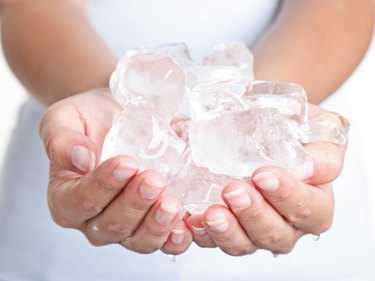
The benefits of eating ice are similar to the benefits of drinking water. Since ice is just frozen water, it does not offer any additional benefits for your health. As long as you use a safe manner when consuming the ice, eating ice can be a fine alternative way to get additional fluid in your diet.
Tip
Eating ice may help keep you hydrated. However, it can also cause other health complications, or manifest as a symptom of an underlying disorder.
Video of the Day
Benefits of Hydration
Drinking water may provide several health benefits for your body. Water is essential for your health, because it affects every cell, tissue and organ in your body. According to the Mayo Clinic, water can help with regulating your body temperature, protecting your joints, protecting soft tissue in your body and helping to expel waste products from your body.
Video of the Day
Consuming water, such as one does through chewing ice, can help prevent dehydration. Dehydration has a negative, potentially fatal, impact on human health. Even slight dehydration can make you feel sluggish, and cause a lack of energy.
According to the Mayo Clinic, some potential signs of dehydration include confusion, dry mouth or tongue, extreme thirst, dizziness, dark urine and less-frequent urination. If you do not get enough water, you can damage your organs, and potentially die.
If you have trouble drinking water, due to illness, or following surgery, you may find that chewing ice or sucking on ice cubes can help keep you hydrated. Though it is not as fast or effective as drinking water, chewing ice can help keep you hydrated, especially when drinking a large amount of water is not possible.
Side Effects of Eating Ice
Though ice is generally safe, as it is just frozen water, it can lead to, or cause, unwanted effects. The most dangerous effect or complication is the potential to choke on the ice you are chewing.
To prevent this, you should chew ice shavings, or ice rings that have holes in the center. This can help prevent you choking on the ice.
In addition, if you chew ice frequently, you may experience some dental issues. Frequently chewing ice can wear away the enamel coating on your teeth. According to the American Dental Association, ice is one of several foods that you should avoid chewing.
If too much enamel is worn off, your teeth can become more sensitive to sensations of hot and cold. It may also cause your fillings to come loose, and the diminished enamel may make you more susceptible to cavities.
Ice-Eating Disorders
Though you may just enjoy eating ice from time to time, which is fairly normal, others may feel compelled to eat ice. If this occurs, there is a chance that the person has an eating disorder known as pica.
According to the National Eating Disorders Association, pica is defined as an eating disorder that involves eating substances that are not typically considered food. This can include any number of items, including paint chips, gum, hair or ice.
Pica is a psychological disorder. People at risk of developing pica include people with iron deficiencies, people with poor nutrition and those with other psychological disorders, such as autism.
Others may feel compelled to eat ice by the underlying condition of iron deficiency, which is known as anemia. People with anemia do not have enough red blood cells to carry oxygen to the brain, and this can cause them to crave ice.
According to a research study published in Medical Hypotheses, in October of 2014, people feel compelled to chew ice because it triggers a response in the body which brings more blood to the brain. The increased blood-flow to the brain means the person can feel more alert, which can lead to more effective cognitive functioning.
- Mayo Clinic: "Water: How Much Should You Drink Every Day?"
- Mayo Clinic: "Dehydration"
- American Dental Association: "Top 9 Foods That Damage Your Teeth"
- National Eating Disorders Association: "Pica"
- Medical Hypotheses: "Pagophagia Improves Neuropsychological Processing Speed in Iron-Deficiency Anemia"